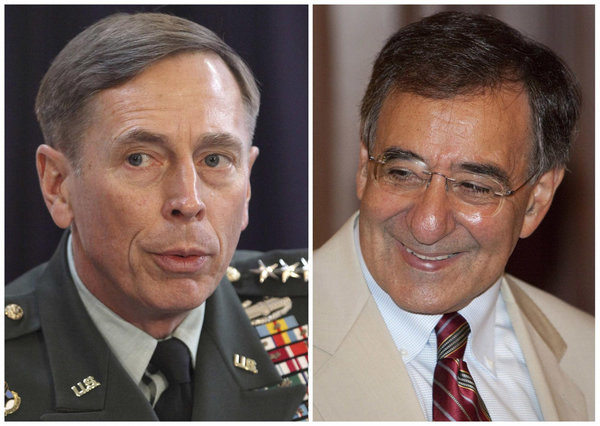-
News >World
Obama sending Panetta to Pentagon, Petraeus to CIA
2011-04-28 09:13WASHINGTON - President Barack Obama plans to name CIA Director Leon Panetta as the next secretary of defense and move Gen. David Petraeus, now running the war in Afghanistan, into the CIA chief's job in a major shuffle of the US national security leadership, senior administration officials and other sources said Wednesday.
Defense Secretary Robert Gates will retire on June 30 with Panetta taking over in July. Gates told senior staff that he recommended Panetta as his replacement six months ago.
Gates described his plans ahead of a White House announcement, expected Thursday, that Panetta would be the president's choice to replace Gates.
Petraeus' move to the CIA is not expected until early autumn, after he wraps up his term as Afghan commander over the summer, officials said.
The four-star general also agreed to retire from the military before taking the position, in a meeting with President Barack Obama to discuss the move in mid-March, administration officials said.
The CIA would probably be led by a deputy over the summer.
All sources spoke on condition of anonymity because the changes had not been announced by the president.
The officials said Obama would name Lt. Gen. John Allen to replace Petraeus as Afghanistan commander, and diplomat Ryan Crocker to be the next US ambassador in Afghanistan. With the turnover slated for September, that gives the administration several months to get Petraeus, Allen and Crocker confirmed by the Senate for their new positions.
Allen, now the deputy commander of US Central Command in Florida, is due in Washington on Wednesday, and sources in Afghanistan said Petraeus was also headed to Washington.
US military and civilian defense leaders call 2011 the make-or-break year for turning around the war and laying the path for a gradual US exit by 2015.
A US official who confirmed Panetta's move to the Pentagon said the White House chose him because of his long experience in Washington, including working as a congressman with budgets at the intelligence agency, as well as his time as CIA director. The official said Panetta had traveled more than 200,000 miles to more than 40 CIA stations and bases and more than 30 countries, including Afghanistan and Pakistan.
Panetta's experience as a former director of the White House Office of Management and Budget will be helpful as the military faces efforts to cut defense spending, said John Nagl, president of the Center for a New American Security, and a member of the Defense Policy Board.
Nagl said Panetta brings "an understanding of the budget process that's probably unmatched, plus complete currency on both wars," in Afghanistan and Iraq.
Gates has come up with $400 billion in prospective cuts to the defense budget over the next 10 years, and Obama has asked him to come up with $400 billion more, Nagl said, a task that will now fall to Panetta, if he is confirmed for the job.
Petraeus, who took over as Afghanistan war commander last June, had been expected to leave that post before the end of this year. His name had been floated for weeks as a possible replacement for Panetta. Current and former administration officials noted that Petraeus would bring a customer's eye to the job as one of the key people to use and understand CIA and military intelligence during the wars in Afghanistan and Iraq.
Petraeus contends that military advances, especially in the traditional Taliban stronghold areas of southern Afghanistan, have blunted the Taliban-led insurgency and given the edge to the US and its NATO partners. A planned transition to Afghan security control begins this year, and the US wants to start withdrawing some of its approximately 100,000 forces in July.
Sending Crocker to Afghanistan would briefly reunite him with the outgoing Petraeus, recreating the diplomatic and military team credited with rescuing the flagging American mission in Iraq. Crocker would replace Ambassador Karl Eikenberry, a former Army general whose two-year tenure has been marred by cool relationships with major players in the Afghanistan war, including the White House, US military leaders and Afghan President Karzai, administration and other sources said.
The nearly wholesale changes at the top of Obama's Afghanistan military and diplomatic lineup will leave fewer military and civilian leaders who have Obama's ear and who also have Afghanistan experience. Allen, the choice to become Afghanistan war commander, has never served there.
Adm. Mike Mullen, chairman of the Joint Chiefs of Staff, will leave his post in September after four years dominated by the ebb of the war in Iraq and the escalation of the one in Afghanistan. The top candidate to replace Mullen is Marine Gen. James Cartwright, who also has never served in Afghanistan.

